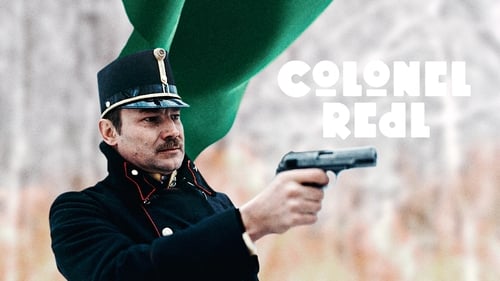Eumenides_0
During the '80s Hungarian director István Szabó made a loose trilogy with celebrated Austrian actor Klaus Maria Brandauer. Colonel Redl is the second movie in the trilogy, and although it is not as well known as the Oscar-winning Mephisto, it is nevertheless as interesting and well made.The movie is a fictionalised biopic of Alfred Redl (Brandauer), who is born to a poor Ukrainian family and in normal circumstances would have been condemned to a life of insignificance; but, blessed with patriotic fervour for the Emperor and influential people who take him under their wing, he's sent to military school where he refines the talents that will be useful to him all his life, namely knowing the right answers to his superiors' questions, being fanatically devoted to the monarchy, and having little moral qualms about betraying friends and comrades. It's no surprise then that he has a steady rise in ranks until he becomes the head of the counter-intelligence services. And that's when his perfect, efficient career starts crumbling.The Austro-Hungarian Empire is a tense place, bubbling with treason and revolutionary plans, devoid of national identity, a mishmash of dozens of peoples - Hungarians, Ukrainians, Czechs, Serbians, Austrians, not to mention Jews - all hating each other. One's background can decide what one's life will be or even get one killed. It's in this atmosphere of subdued terror, lies, and paranoia that Redl, a Ukrainian hiding his Jewish ancestry and ashamed of his poor background, operates a network of espionage to ferret out traitors and criminals in the army, for the army is all that sustains the Emperor's power in an Empire that has no reason to know the concept of patriotism.One day he's brought to the presence of Archduke Ferdinand and ordered to find a patsy to alleviate inter-ethnic tensions. World War I is just around the corner and the Archduke wants a sensational public case of treason that will unify the Empire against a common enemy. When Redl's first victim, a Hungarian nobleman, backfires on him, a plot is hatched to make him look like a spy for the Russians.Based on a play by John Osborne, the movie shows Redl as a Kafkaesque anti-hero, an innocent man caught in the paralysing, faceless world of bureaucracy, unable to extricate himself from it because it operates under an incomprehensible logic. It's a far cry from the real Redl, though, who was blackmailed by Russians into spying for them lest his homosexuality be exposed. I'm not one to judge quality by historical faithfulness, but I can't help thinking Redl's real story could make an equally remarkable movie one day.The movie is consistently interesting, although it develops slowly, covering many years in Redl's life, from childhood to adulthood. Brandauer plays a cold, reserved, callous man who nevertheless draws sympathy for his devotion and work ethic. Although the viewer is left wondering whether Redl didn't just waste his life being too loyal to the Emperor, it is impossible not to feel sorry for him when the Empire he lives for betrays him.Armin Mueller-Stahl's performance as the Archduke isn't less spectacular. Showing ruthlessness, control and a sharp mind, this political strategist does what he has to do to keep the Empire together.Although the facts are fictionalised, the movie shows Szabó's eye for historical details and no scene fails to produce wonder at the way a dress or piece of furniture looks or at the magnificence of the historical sites used for locations.István Szabó and Klaus Maria Brandauer don't get enough credit nowadays, but in the '80s they were an unstoppable duo and Colonel Redl is one of their masterpieces.
marissas75
"Colonel Redl" is based on a famous scandal that took place in the last years of the Austro-Hungarian empire, and its greatest strength is in how it evokes the masculine militarism of the era. It follows the life of Alfred Redl (Klaus Maria Brandauer), who rose from humble origins to become a spymaster for Crown Prince Franz Ferdinand, but struggled to repress his homosexuality and eventually betrayed his country.The movie makes Redl less treasonous than he seems to have been in reality, and Brandauer's performance keeps him sympathetic, too. We see how Redl's extreme loyalty to the army destroys his humanity and fills him with self-loathing; thus, when he finally stops lying to himself, it comes as a relief (even though this now means that he is lying to everybody else)."Colonel Redl" is probably too long (2 hours 20 minutes) for the story it wants to tell, and yet it still sometimes glosses over its characters' motivations. For instance, Redl claims he has no interest in marrying, then the very next scene depicts his wedding; and his wife never gets sufficiently characterized. Sometimes the scene transitions are subtly clever; other times they are abrupt and choppy."Colonel Redl" is thus neither accurate history nor fully engaging drama, but it is a good portrait of the declining Austro-Hungarian empire. It shows many of the factors that led to World War I: pervasive ethnic tensions, the belief that war was necessary and proper, and a military command more concerned with preserving archaic ideals than with investigating actual, pressing threats. In the end, they paid for this, when discontented Serbians assassinated Franz Ferdinand and started World War I--the war that caused the world of "Colonel Redl" to disappear for good.
Marcin Kukuczka
The successful collaboration of Istvan Szabo with the Austrian actor Klaus Maria Brandauer in MEPHISTO (1981) resulted in another sensational movie, OBERST REDL (1985): again a story of a man in the German speaking country, again psychological theme of self confidence, again personal tragedy. However, in spite of the similar aspects that both movies share, the latter appears to attract in a different way.Is it history depiction that attracts? While MEPHISTO was a story of an actor who desired appreciation and acceptance from the Nazis and, by means of compromise and adjustment, hoped to survive (being at the same time a very realistic insight into historical reality), OBERST REDL, based upon John Osborne's play "A Patriot for Me" is a story of a soldier devoted to the Austro-Hungarian Empire. Living in its fading period, he gets through promotion and degradation. Yet, unfortunately, history is poorly executed. The depiction of the empire does not appear convincing. The Habsburgs are overly "cruel and cold". As a result, relating Redl to Mephisto and the background power the both characters serve would surely harm the Habsburgs since Mephisto cannot be understood without the Nazis and Redl without the Habsburgs. So what attracts in the movie and involves the viewer? This is the story of a life...a very unique insight into the main character's feelings and experience. His fanatical devotion that leads to a personal tragedy; a "son of the emperor," as called once by a priest in church, that turns into a "traitor"; an ambitious soldier that becomes an indefatigable spy. Brandauer does a perfect job in the role and I dare claim that, in the matter of the lead role, Redl is much more appealing than Mephisto. He represents a blind service of anyone who absolutely believes in political systems, governing bodies and who places all his hope in military career when war is more likely to break out. Redl is not a particular history but history in general that so often experiences enthusiasm, devotion, trust, success, but also disappointment, disillusion, fear, despair and madness. History personified in human being. I am aware that this aspect was also present in MEPHISTO, but here, the character can be analyzed within history or outside history.But from this clearly psychological analysis of the movie, we can easily switch to general political aspect. "I hate politics" says Redl after unpleasant events and disillusions. Why? Because politics leads him to do the things he would probably never do out of his free will. These are searches, imprisonments, investigations where people commit desperate acts including suicide, where friends turn into enemies, where one becomes Judas and where there is no room for humanity and forgiveness. It's important to mention the disturbing search at Victor Ullman's.A lot of thought provoking moments will draw your attention. First, consider Schorn's plot and the fatal duel. Who was guilty? Is death so easy to accept? I also reflected on the case of the Jews. Redl announces that contacting Jewish people will be unwelcome or, in most extreme cases, punished; yet, it is him who in the following scene writes a letter to Dr Sonnenschein, a Jew. Aren't we brutally masked among other people? Doesn't political correctness blind our "selves"? The famous mask ball in which Redl takes part clearly says for itself...As for performances, they are very good. As I have already mentioned, Klaus Maria Brandauer does a great job portraying a man who is not that easy to be discovered or interpreted. On the one hand, he is so desirous of personal military career, on the other hand, he doubts... I also loved Jan Niklas as Kristof Kubinyi, Alfred Redl's friend whose fate occurs so unexpected. Gudrun Landgrebe gives a memorable performance as Katalin Kubinyi for whom Redl seems to care and whom Redl really loves. And marvelous presence of Armin Mueller-Stahl as the Crown Prince - he supplies the role with a sense of royalty.Except for the cast, the film's strong point is the excellent use of visual effects, like locations, wardrobe and sets. It's magnificent, luxurious, elegant and very subtle. In one little moment, Redl sees his emperor, Franz Josef, standing at the lake and is absolutely overwhelmed by seeing his "Kaiser". The scene is as if a moving picture from the old photos that can be found in Austria and that remind us of the charming but lonely years of the late emperor.OBERST REDL is indeed an important movie to be seen by film fans. Yet not for the sake of history whatsoever but for the sake of great thought provoking content. Does the world judge our lives justly?
gratian-2
This film evokes powerfully the period and place in which it is set. Its plot is both interesting and intelligent. The acting is of the highest calibre; both Klaus Maria Brandauer and Gudrun Landgrebe are both world class artists. Viewers should see more German film. This is a stunning piece of work by a director of great insight and ability.




